As we head into Avengers: Endgame, and no doubt into a radically altered MCU going forward, let’s revisit the Steve/Bucky, or Stucky—the ship that launched fifty thousand fanfictions and still reigns supreme.
Comics readers had shipped Steve and Bucky long before the movies were a glimmer in Marvel Studios’ eye. Steve Rogers’ inconsolable grief over his best friend and partner in crime-fighting Bucky Barnes’ death is well-documented throughout decades of Captain America comics, one of the foremost elements of the character. It wasn’t a big leap to suppose there was more to Steve’s profound sense of loss than met the eye.
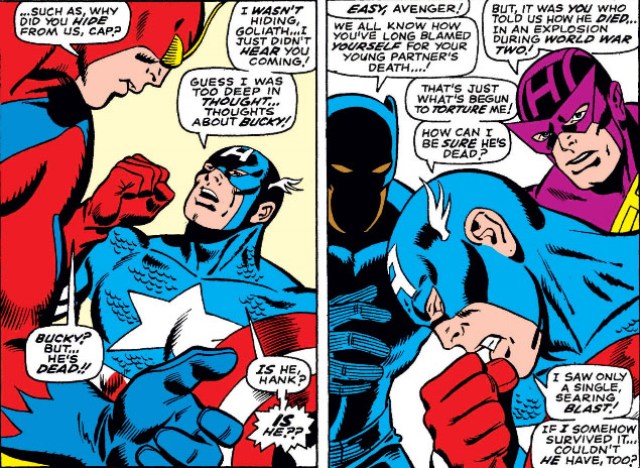
When comics writer Ed Brubaker broke the unspoken rule of Who Must Stay Really, Really Dead and brought Bucky back in 2004 as the hardened, brainwashed assassin The Winter Soldier, the stage was set for a ship that had everything and was steeped in the sort of pathos that inspires countless fanworks: former best friends torn apart by tragedy, forced into opposition. Not only did Steve and Bucky share an important history, but Bucky occupied a torturous present, while Steve was consumed with guilt for inadvertently leaving Bucky behind.
The movie-based ship was well-fed by Captain America: The First Avenger, which highlighted Steve and Bucky’s tender friendship and willingness to sacrifice everything for each other on Steve’s road to becoming Captain America. Casting two attractive actors in the roles certainly didn’t hurt. Though public plans for additional Cap movies were unknown at the time, Marvel signed Sebastian Stan to an extensive contract deal, which suggested that they would be taking Bucky in the Brubaker direction after he seemed to die at the end of First Avenger. Steve is so aggrieved when Bucky falls off the train that he soon follows after, crashing his plane into the Arctic and exiting the Bucky-less world.
If you’re a fan of historical-era Steve/Bucky, The First Avenger provides some scenes and visuals ripe for development: unlike many male friendships depicted onscreen, especially in action movies, Steve and Bucky are tactile, exchanging touches and embraces and knowing looks. They make statements of affection both comedic (Bucky: Don’t do anything stupid until I get back / Steve: How can I? You’re taking all the stupid with you) to declarations screamed in an enemy compound on fire (Steve: GO! / Bucky: NO! NOT WITHOUT YOU!).
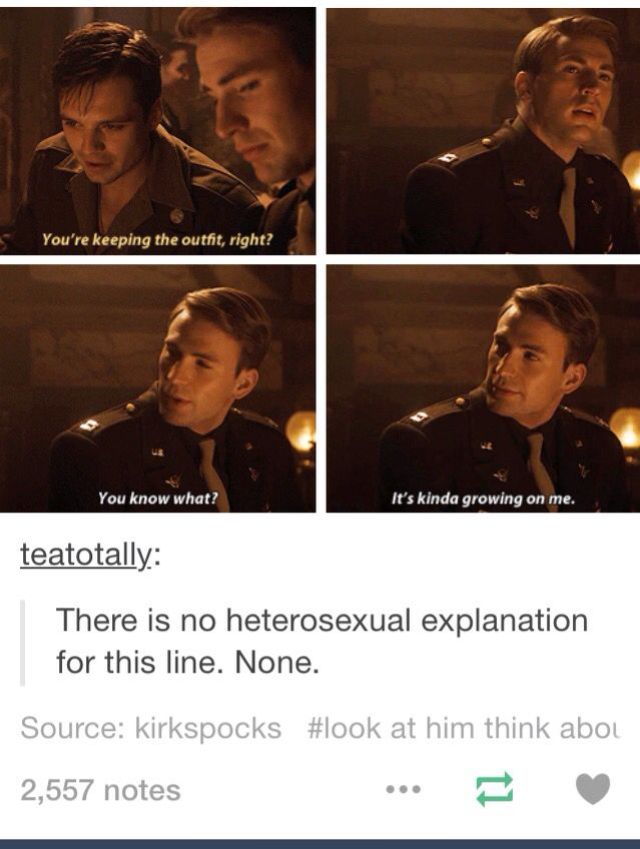
Fanworks set in this era tend to depict Steve and Bucky living together in Brooklyn before the war, or reunited on the fields of battle thereafter, with Bucky either delighted or dismayed by Steve’s transformation. Many authors, visual artists, and meta-writers became experts in 1930s Brooklyn studies and the queer culture of pre-war New York City.
But it was the modern-day-set Captain America: The Winter Soldier that launched this pairing into the stratosphere. I got to see that movie before its release at a special screening, and I knew at first glance that Steve/Bucky was going to take off—but even I couldn’t have predicted just how massive the ship would become.
Winter Soldier begins with Steve’s attempts to build a new life in a new century while still hung up on the ghosts of the past. When one of those ghosts is made flesh and it’s revealed that Bucky is alive and is now an apparent enemy, it’s as though Steve’s greatest wish and greatest nightmare have come to pass in the same moment. But his faith in Bucky is unwavering, even when there’s no proof that his friend still exists within the Winter Soldier’s callous shell.
The movie is full of the sort of dialogue that sings to a shipper’s ear: “Even when I had nothing, I had Bucky,” Steve tells his new friends. “Best friends since childhood, Bucky Barnes and Steven Rogers were inseparable on both schoolyard and battlefield,” the voiceover at the Captain America Smithsonian exhibit intones, as a film reel shows a 1940s-era Steve and Bucky laughing together. “But I knew him,” the Winter Soldier winces in pained confusion as he tries to understand how it is that he recognized Steve.
A flashback sequence to Brooklyn features a dapper, handsome young Bucky consoling Steve after his mother’s death and vowing that Steve will never have to go it alone. (Steve: Thank you, Buck, but I can get by on my own / Bucky: The thing is, you don’t have to. I’m with you ’til the end of the line, pal.)
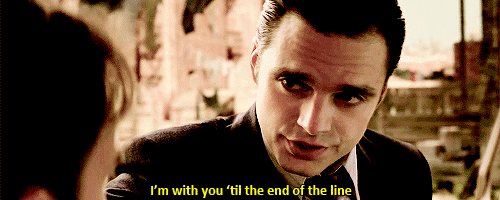
Steve will repeat this line to Bucky at the climax of Winter Soldier, a throwdown fight between the two of them that is brutal as it is intimately charged. He puts all of his faith in the idea that Bucky Barnes is still somewhere inside the Winter Soldier, and in the movie’s last minutes, he is rewarded. Bucky drags Steve out of the water and leaves him on the riverbank; in the post-credits scene, we see Bucky visit the Smithsonian exhibit in an attempt to recover more of who he once was.

It helps that Captain America: The Winter Soldier is an excellent movie—I would argue that it is the best in the MCU. Even the most casual movie-goer left understanding the lengths Steve and Bucky would go for each other, and if you are inclined to subtextual fan pairings and creating fanworks, this became the mothership.
I’ve never experienced an outpouring of creativity and enthusiasm such as Steve/Bucky sparked in those post-Winter Soldier days, and I’m unsure if it will ever be replicated again. On AO3 alone, there are more than 40,000 stories tagged with their coupledom, while fan art, cosplayers, zines, photo edits, crafts, and gifs abound. The most-read Stucky stories have more than 300,000 hits, a staggering audience by any metric even taking rereads into account. They remained in the top ten ships on Tumblr in 2018, the only Marvel pairing to do so.
While fandom ships tend to stay isolated in our pockets of the Internet, Steve/Bucky had such obvious canonical roots, and was so widely popular, that it made the leap into mainstream awareness. The ship became established enough that some fans and critics wondered openly if there was a possibility it would be made a confirmed onscreen reality.
The MCU’s powers that be didn’t seem interested in receiving that memo. “People have interpreted that relationship all kinds of ways, and it’s great to see people argue about it what that relationship means to them,” director Joe Russo equivocated. “We will never define it as filmmakers, explicitly, but however people want to interpret it.”
“Marvel drove a nail into the coffin of Bucky/Cap speculation,” lamented Vanity Fair after Captain America: Civil War positioned Bucky to witness Steve and Sharon’s weird kiss with a smile on his face. Even so, the movie gave us Crossbones’ loaded taunt to Steve, “He remembered you. Your pal, your buddy, your Bucky,” and a host of other scenes that showed how connected the two remained.
While I have my issues with the messy Civil War and the relatively little screentime the MCU has given Steve and Bucky since, there’s no denying that their relationship continues to be a huge driving force behind many of the biggest set pieces affecting the Avengers. Civil War was a Civil War because Steve refused to turn his back on Bucky or turn him over to authorities, and he and Bucky fight Tony Stark together without compunction at the movie’s end. Steve finds Bucky a safe harbor in which to recover in Wakanda, and immediately upon their reunion in Infinity War, the two embrace. Bucky remains at Steve’s side until he is the first to turn to dust, his confused query—”Steve?”—lingering in the air as Steve watches him fade away, horror-struck.
Whether you view them as friends or boyfriends, Endgame would do well to allow the poignancy of Steve and Bucky’s history to have some more time in the sun. A big unanswered question of the fast-approaching film is just how much the original Avengers will get to interact with those who were dusted. Will they be magically restored mid-movie, or join in only at the likely tragic end? The fact of the confirmed Falcon/Winter Soldier Disney+ series suggests that neither Bucky nor Sam Wilson takes up the Cap mantle in the movies as they have in the comics (unless the premise of the show is that they take it up together). Will they have the chance to properly reunite with Steve at all?
It may be that Steve and Bucky hardly get to exchange words with each other again. But I’d like to think that Marvel knows how attached many of us are to seeing some sort of resolution to a drama first begun in the schoolyard in Brooklyn. And no matter what happens, fandom is more than capable of generating narratives beyond what we see onscreen—that’s fandom’s bread and butter. At the end of the line, we’ll still be here to read between them.
(images: Marvel)
Want more stories like this? Become a subscriber and support the site!
—The Mary Sue has a strict comment policy that forbids, but is not limited to, personal insults toward anyone, hate speech, and trolling.—



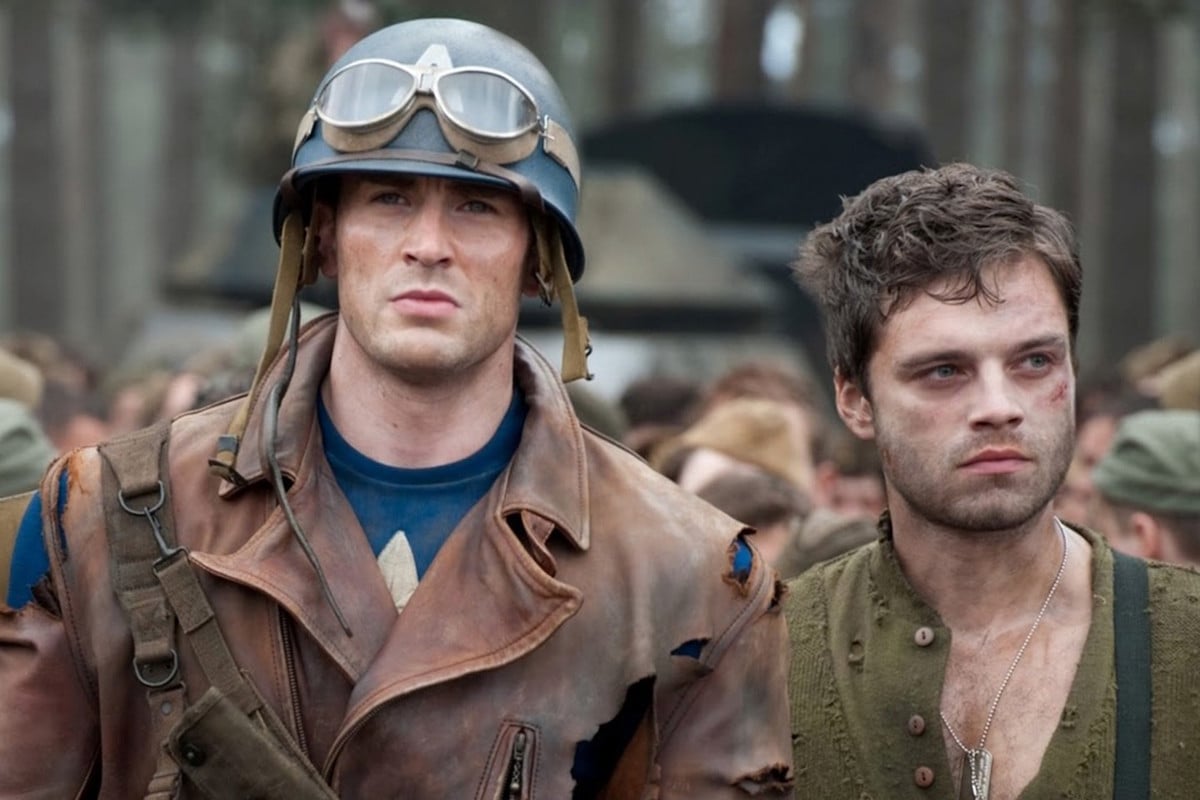
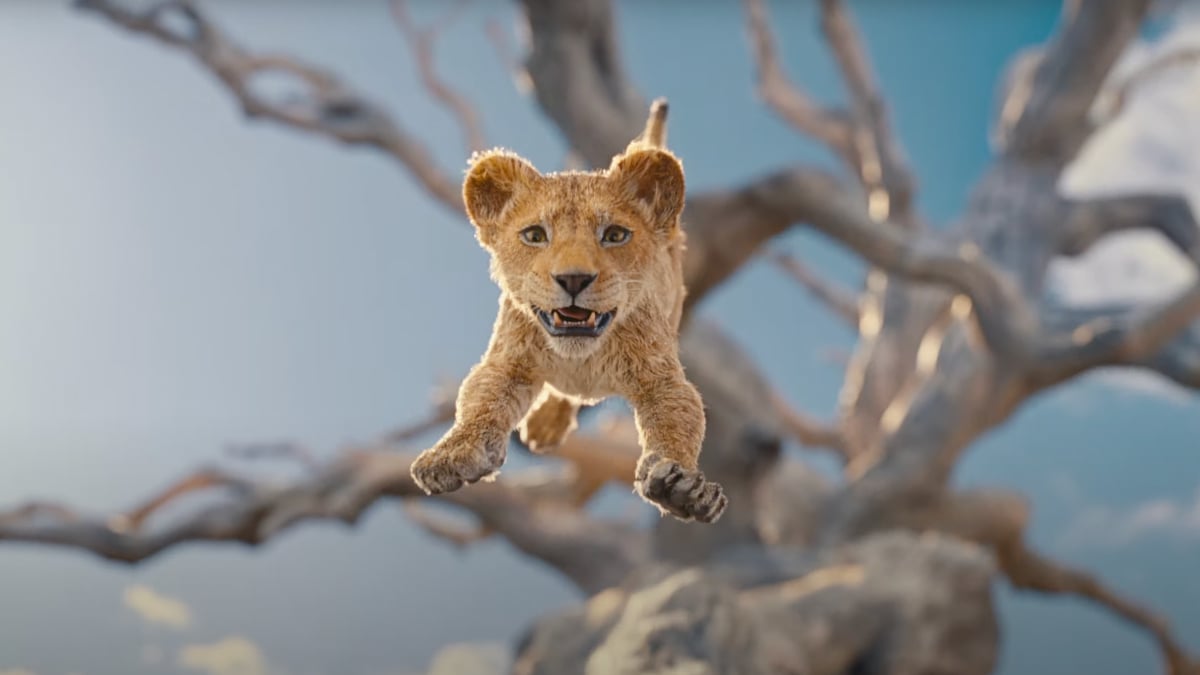
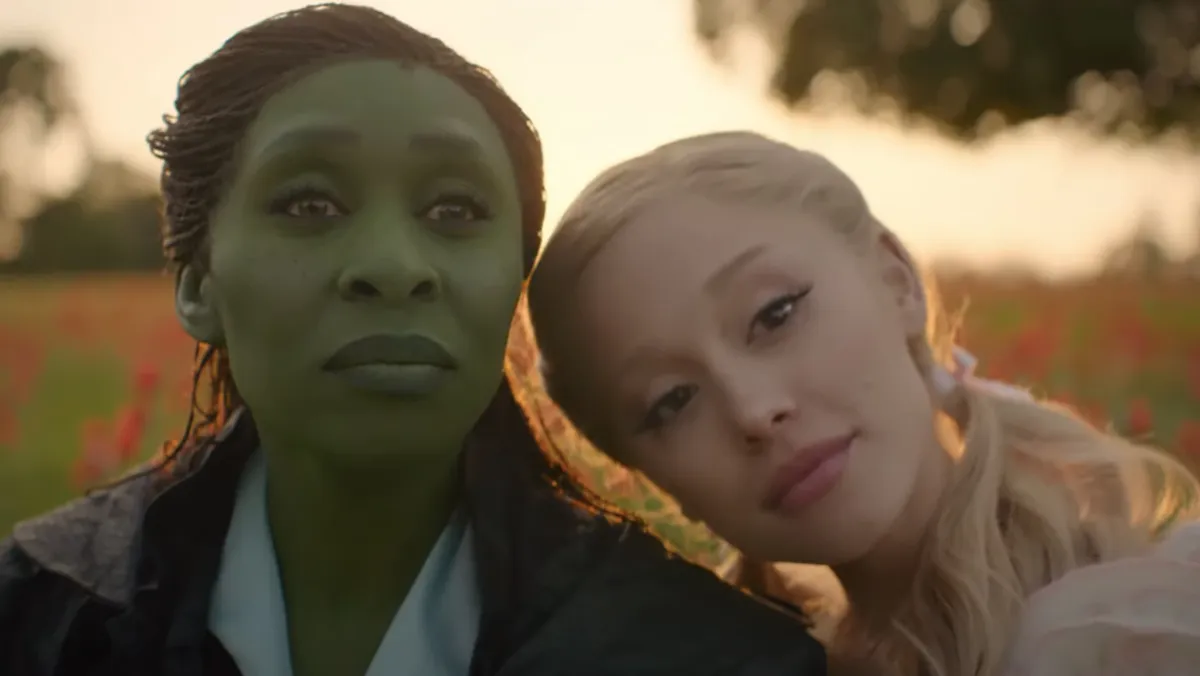




Published: Apr 22, 2019 03:46 pm